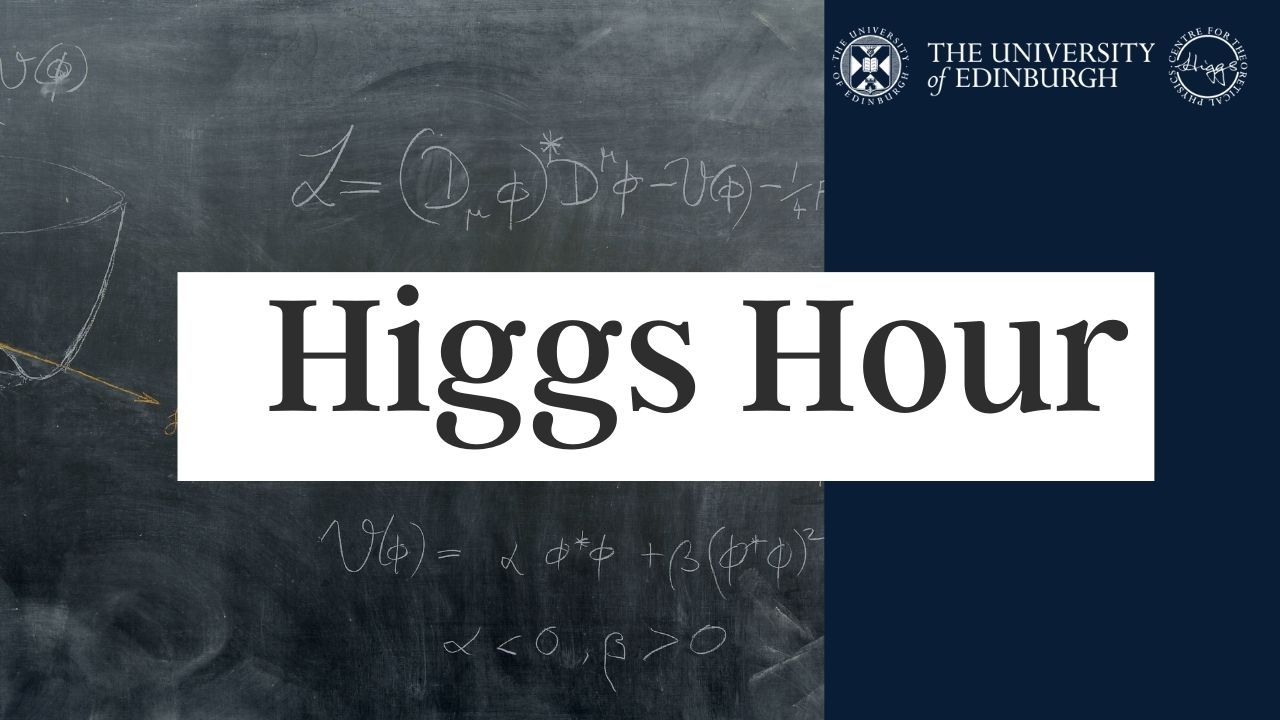The main page content begins here.
Higgs Hour

Contacts

Colloquia Organizer
- Person
- Sadegh KHOCHFAR
- Email address
- sadeghk@roe.ac.uk
This event is a Event.
-
Machine learning meets Monte Carlo sampling—Gurtej KANWAR
Monte Carlo sampling is a ubiquitous method for numerically estimating high-dimensional integrals. Unfortunately, standard methods for Monte Carlo sampling sometimes become highly inefficient for certain problems, for example in important limits of lattice QCD simulations that are used to study the Standard Model. I will discuss my ongoing work to ...
Higgs Centre Seminar Room, JCMB
This event is a Event.
-
Controlling active matter: Insights from the response—Luke DAVIS
Active constituents burn fuel to sustain individual motion, giving rise to collective effects that are not seen in systems at thermal equilibrium, such as phase separation with purely repulsive interactions. There is a great potential in harnessing the striking phenomenology of active matter to build novel controllable and responsive materials ...
Room 6206, James Clerk Maxwell Building
This event is a Event.
-
Classical Gravity from Quantum Fields—Donal O'CONNELL
Theoretical research on gravitational waveforms from compact binary inspirals (of the kind observed for example at LIGO) has been reinvigorated in recent years by an influx of ideas and techniques from collider physics, especially techniques used to understand the Standard Model at the Large Hadron Collider. I will explain the ...
Higgs Centre Seminar Room, JCMB
This event is a Event.
-
Understanding black hole spin—Ricarda BECKMANN
Astrophysical black holes are described by two properties: their mass and their spin. While the mass evolution of black holes in the context of their host galaxies has been the subject of many studies, comparatively little is understood about the spin of massive black holes. Much like the mass, the ...
Higgs Centre Seminar Room, JCMB
This event is a Event.
-
Modelling accuracy and error for beyond-concordance physics in cosmological observables—Ben BOSE
The next generation of galaxy surveys (Euclid, The Vera Rubin Observatory, DESi, DES) will be providing us with highly precise measurements of the cosmological galaxy distribution. In order to extract the most cosmological and gravitational information from these measurements, our theoretical models need to be equally accurate. While the standard ...
Higgs Centre Seminar Room, JCMB
This event is a Event.
-
To reset, or not to reset!—Somrita RAY
Stochastic resetting [1] can either accelerate or delay a dynamical process that takes a random
time to complete (i.e., a first-passage process). Tuning the physical governing parameters can invert such effect of resetting on the mean completion time of the process, leading to a resetting transition. In this talk ...
Higgs Centre Seminar Room, JCMB
This event is a Event.
-
A new theory of the universe—Neil TUROK
Observations of the universe on very small and large scales have revealed a surprising economy in its basic laws and structure. In this light, we have attempted to find new, more minimal solutions to cosmology’s central puzzles. Instead of postulating a pre-hot big bang period, such as inflation, we ...
Higgs Centre Seminar Room, JCMB
This event is a Event.
-
Fundamental physics from galaxy shapes—Alex HALL
The Lambda Cold Dark Matter model continues to provide a good fit to a wide range of cosmological data, and extensions to the model are almost all disfavoured observationally. This is troubling since neither CDM nor Lambda, together constituting 95% of the cosmic energy budget, are understood. These dark components ...
Higgs Centre Seminar Room, JCMB
This event is a Event.
-
How and when the Universe warmed up (and what that means for learning about dark matter)—Laura KEATING
One of the most important questions in astrophysics is what is the invisible “dark” matter that accounts for most of the matter in our Universe? One method of learning about the nature of dark matter is by studying the properties of diffuse intergalactic gas in the early Universe. However, the ...
Higgs Centre Seminar Room, JCMB
This event is a Event.
-
Scattering amplitudes and inspiraling black holes—Mao ZENG
This will be a hybrid event with Mao presenting from the Higgs Centre.
Future gravitational wave detectors require highly precise predictions for the waveforms from inspiraling black holes and neutron stars. We present advances in binary inspiral dynamics by taking classical limits of scattering amplitudes in perturbative quantum gravity. The ...
Higgs Centre Seminar Room, JCMB
This event is a Event.
-
From abstract matrix models to observations in the sky—Suddhasattwa BRAHMA
The BFSS matrix model is a proposed non-perturbative definition of M-theory in which space is emergent. In this talk, I shall present a new paradigm of early-universe cosmology in the context of the BFSS theory. Specifically, I will show that matrix theory leads to an emergent, non-singular cosmology which, at ...
Higgs Centre Seminar Room, JCMB
This event is a Event.
-
Strong field QED: probing fundamental physics with intense lasers—Anton ILDERTON
I will give an overview of efforts to probe non-perturbative structures in QED using intense laser fields, beginning with an introduction to the Furry expansion of observables in strong backgrounds, which is the basis of most modern theory calculations in "strong field QED". I will then introduce the Ritus-Narozhny conjecture ...
Higgs Centre Seminar Room, JCMB
This event is a Event.
-
Interference, Caustics and Oscillatory Integrals—Job FELDBRUGGE
Interference is one of the most universal phenomena in nature. In classical physics, the linear superposition of sound waves, surface waves, radio waves, light or gravitational waves all exhibit the same characteristic patterns of constructive and destructive interference. Interference is also fundamental to quantum physics, as exemplified by the Feynman ...
Higgs Centre Seminar Room, JCMB
This event is a Event.
-
Cosmology with radio and optical surveys—Alkistis POURTSIDOU
I will describe how radio telescope arrays like MeerKAT and the Square Kilometre Array can kick off an exciting new era in cosmology using the innovative neutral hydrogen intensity mapping technique. I will also talk about the forthcoming Euclid satellite mission, concentrating on the theoretical modelling challenges we need to ...
The Higgs Centre for Theoretical Physics
This event is a Colloquium.
-
Higgs Hour: 'Topologically Active Polymers'—Davide MICHIELETTO
Polymer physics principles are increasingly acknowledged and applied to understand the behaviour of genome organisation and biopolymers in vivo.
In spite of this they heavily rely on the assumption that polymers do not change topology (or architecture) in time,
i.e. if they start as a linear chain of segments ...
Higgs Hour Zoom
This event is a Colloquium.
-
Higgs Hour: 'Expanding the BAO science case'—Florian BEUTLER
Cosmology has the potential to test fundamental physics through the discovery of new particles (e.g. dark matter) and new fields that governed the Universe's expansion at early times (inflation). One of the most powerful tools available for such studies is the Baryon Acoustic Oscillation (BAO) signal. Many future ...
Higgs Hour Zoom
This event is a Colloquium.
-
Higgs Hour: 'Small stellar systems, big astrophysical questions'—Anna Lisa VARRI
The blooming era of ‘precision astrometry’ for Galactic studies opened by Gaia and the revolutionary beginnings of ‘gravitational wave astronomy’ enabled by LIGO truly bring the rich internal dynamics of collisional stellar systems to the centre stage. But the current interpretative picture of the role of ‘small scales’ in the ...
Higgs Hour Zoom
This event is a Colloquium.
-
Higgs Hour: 'Exploring the limits of magnetism in two-dimensional materials'—Elton SANTOS
The family of 2D compounds has grown almost exponentially since the discovery of graphene and so too the rapid exploration of their vast range of electronic properties. Some family members include superconductors, Mott insulators with charge-density waves, semimetals with topological properties, and transition metal dichalcogenides with spin-valley coupling. Among several ...
Higgs Hour Zoom
This event is a Colloquium.
-
Higgs Hour: 'Lattice calculations for high-precision tests of the Standard Model of Particle Physics'—Vera GÜLPERS
The LHC has not yet found any significant deviation from the Standard Model at large energies and thus, indirect high-precision searches for signatures of physics beyond the Standard Model at low energies become more and more important. For any quantity involving the strong nuclear force, the only known approach for ...
Higgs Hour Zoom
This event is a Colloquium.
-
Higgs Hour: 'Extracting resonant scattering and decay amplitudes from lattice QCD'—Maxwell HANSEN
The strong force is governed by the elegant mathematical framework of quantum chromodynamics (QCD). The building blocks of QCD are quarks and gluons, and the interactions of these constituents lead to a rich variety of observed phenomena, from the basic properties of nuclei to the production of heavy elements in ...
Higgs Hour Zoom
This event is a Colloquium.
-
Higgs Hour with Sergey Koposov 'Hyper-velocity stars as probes of the super-massive black hole in the Galactic centre'—Sergey KOPOSOV
Hyper-velocity stars are interesting objects that were first theoretically proposed by Richard Hills as products of interaction of a binary star and a supermassive black hole, that leads to the star being ejected out the galaxy with the speed of hundreds and thousands of km/s. About 15 years ago ...
Higgs Hour Zoom
This event is a Colloquium.
-
Higgs Hour: 'Driven Active Nematics: External stresses drive topological transitions in spontaneously flowing fluids'—Tyler SHENDRUK
While traditional fluids only flow when acted upon, a remarkable class of biomaterials spontaneously flow by means of their own internal energy. These “active fluids” comprise a wide range of biological systems that bridge between biological and condensed matter systems. This Brown Bag talk will focus on the example of ...
Higgs Hour Zoom

Find us on social media:
TwitterFacebookYouTube